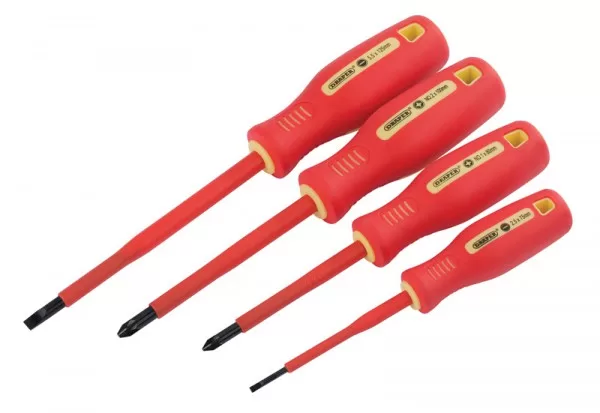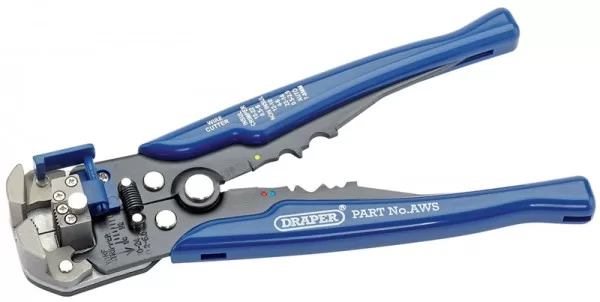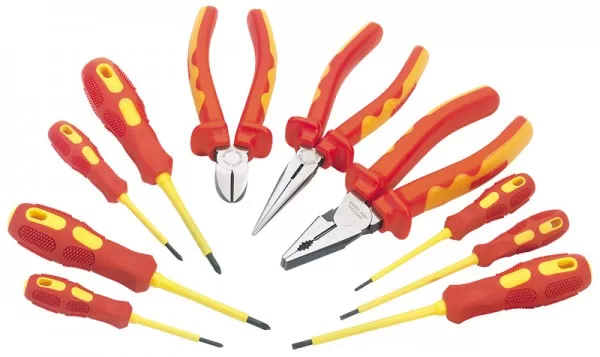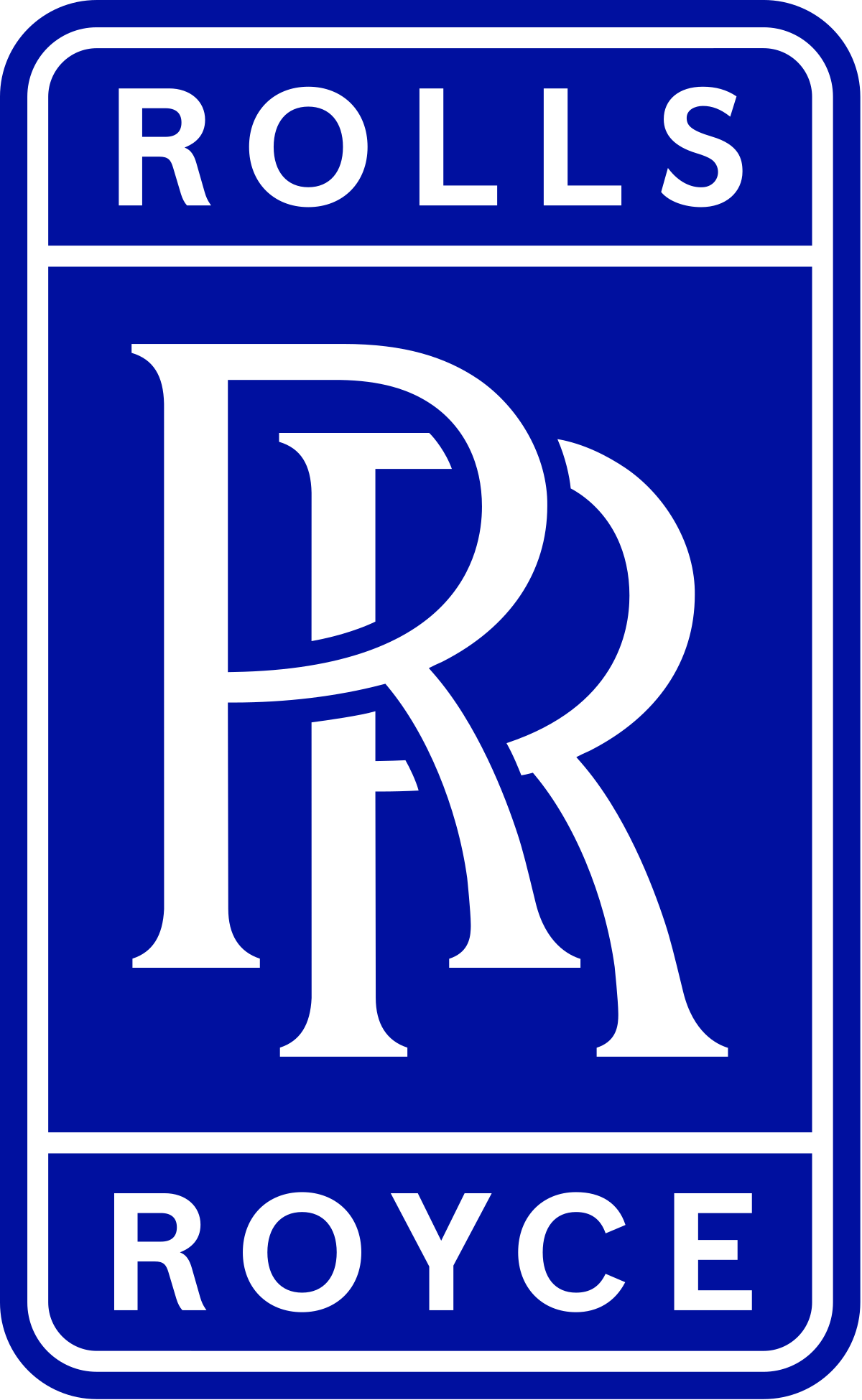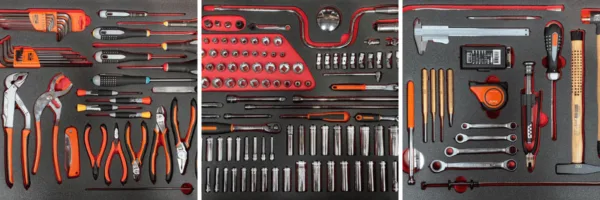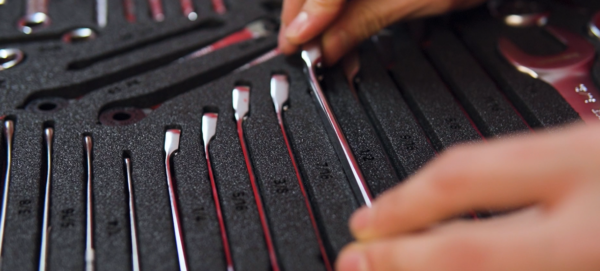As a working electrician, investing in professional electrician’s tools is essential. After all, tools are the bread and butter of your trade, helping you to complete each job safely and efficiently.
With that in mind, we’ve put together a checklist of the top 19 electrician tools no working electrician would be without. Arm your electrician EDC bag with these and you’ll always be prepared for whatever the job throws at you.
Essential Hand Tools
1. Insulated Screwdrivers
When you’re working with electrical currents, insulated tools are a must. Insulated screwdrivers in differing shapes and sizes are an essential to have in any electrician tool bag. The insulated handles offer protection against accidental electric shock or electrocution when you need to remove screws to access electrical panels or installing and handling a circuit breaker.
2. Insulated Pliers and Wire Strippers
Electricians rely on insulated wire strippers to peel back the insulating outer sheath from cables, whereas insulated pliers are needed to straighten, trim, or strip wires.
Just as with insulated screwdrivers, insulated pliers and wire strippers are must-have tools for electricians. Types of plier you may find useful as an electrician include long nose pliers, combination pliers, side cutting pliers and water pump pliers.
3. Wire Cutters
Wire cutters are a tool electricians use to cut wires. They are commonly used with aluminium, brass, iron, and steel wires and come with an insulated handle to safeguard against electric shocks.
4. Electrical Tape
Electrical tape or insulation tape prevents electrical currents from touching or passing between live wires. It is usually made of a malleable material such as vinyl, plastic, or fibreglass fabric.
5. Wire Crimpers
Wire crimpers are a type of crimping tool that can be used to prevent against electrical shortages or faulty connections by allowing you to attach wires together and connect them to other connectors to form a secure connection.
6. Cable Cutters
Just as the name suggests, cable cutters allow you to easily cut through standard electrical wiring. Fully insulated models are essential when working with high voltage wiring and electronics. If you regularly work with thicker than standard cabling, you should also consider investing in cable shears
7. Conduit Benders
Conduit benders enable you to curve conduit piping and bend angles into a conduit in which electrical wires will be inserted. They’re an essential tool that electricians use when running wiring along walls and around obstacles.
8. Utility Knife
Utility knives, often referred to as Stanley knifes or box cutters, feature a retractable blade you can extend and replace as they go blunt. Electrician’s utility knives typically have a plastic, aluminium or steel casing with a stainless steel or carbon blade. They’re a versatile electrician tool with a variety of uses, for example: cutting electrical tape, opening sealed boxes, and cutting sheathing from non-metallic cables.
9. Torch
From loft spaces to basements, electricians get to work in the nicest of places! Isolating power in order to perform electrical work safely also means that you sometimes leave yourself without an artificial light source – not ideal if natural light is poor or unavailable. It’s precisely for this reason that a torch or a headlamp is such an invaluable tool to have in your electrician tool kit.
Power Tools for Electricians
10. Power Drills
When you’re challenged with working in a hard to reach space (something electricians are all too used to) a power drill is the perfect tool to have in your electrician EDC bag. Whether it’s accessing electrical panels in barely accessible areas, or just helping to get the job done a little faster (and with less effort) a cordless drill is an essential electrician tool.
11. Impact Drivers
Another essential power tool for electricians, impact drivers or impact wrenches allow you to drive in lag bolts, long screws, and fasteners quickly and easily, making light work of this otherwise manually challenging and time-intensive task.
12. Hole Saw Kit
Electrical boxes. Wooden and metal studs. Drywall and joists. Wires and conduits. Hole saws cut through so many components and materials. Investing in a saw hole kit will ensure you’re well equipped with a variety of hole saws in the handiest sizes, including those that can easily and safely cut through metal.
Measuring and Testing Instruments
13. Multimeters
Multimeters or voltmeters (as they’re also sometimes known) measure two points in an electronic circuit using readings such as voltage levels and amperage resistance. You’ll find them in both AC (alternating current) and DC (direct current) varieties.
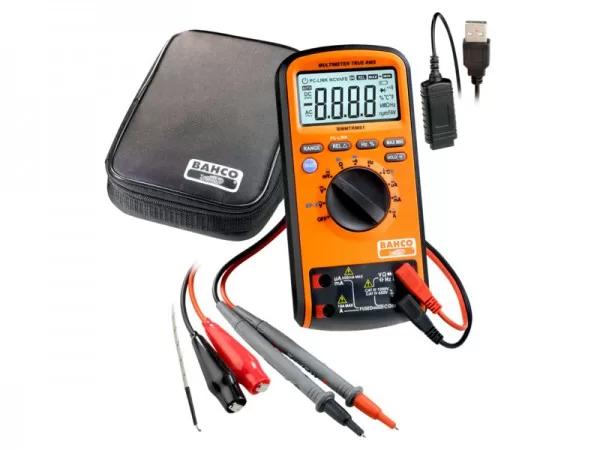
14. Clamp Meters
Clamp meters are another type of electrical testing tool you may find it handy to have in your electrician tool bag. Also known as a current probe, clamp meters have adjustable jaws you can clamp onto electrical conductors to measure currents.

15. Circuit Breaker Finders
This handheld device helps electricians to identify which outputs are connected to which circuits in a building – not always an easy feat! It comes in two parts: a transmitter, which connects to the circuit in a breaker, and a receiver which lets the electrician know which circuit the outlet belongs to.
16. Circuit Tester
Circuit testers (also known as circuit analysers) check the condition of a circuit to determine if an output is working or whether there’s a fault present. It’s one of the fastest and most accurate ways of pinpointing whether an output is operating correctly, whilst protecting an electrician from risks such as electric shocks.
17. Voltage Tester
Voltage testers allow you to test for live currents. They’re an essential safety tool for electricians, allowing you to detect and isolate any live currents in the area before beginning work.
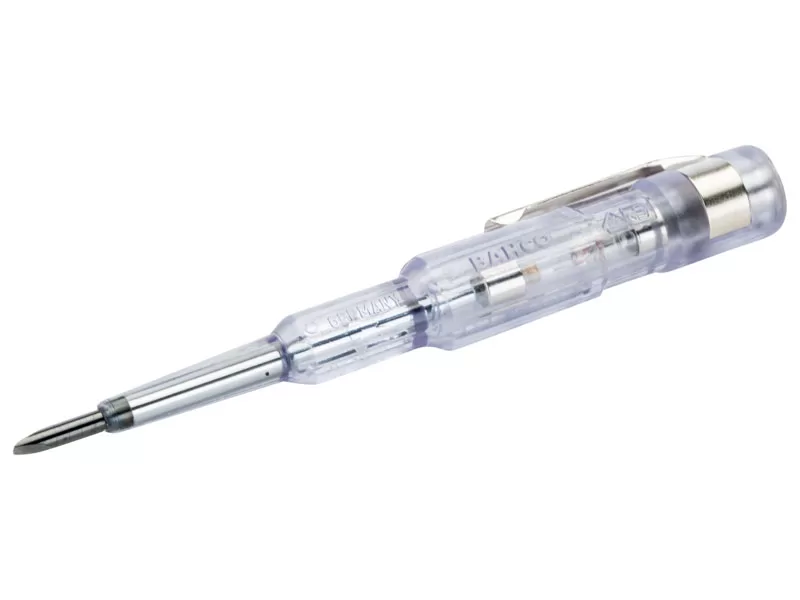
Safety Gear for Electricians
18. Personal Protective Equipment (PPE)
As with any trade, it’s essential that electricians take necessary safety precautions by wearing the correct PPE when working. For electricians, this includes a set of safety googles and a pair of insulated gloves. Electricians may also find it beneficial to wear a fire-retardant shirt and to carry a rescue rod, enabling them to be moved safely if electrocuted.
19. Insulated Tools
Insulated tools are an absolute necessity when working with electrical components and hardware. At a minimum, electricians should invest in basic insulated hand tools such as pliers, wire cutters, wire strippers, and screwdrivers, all of which can minimise the risk of electrocution while working. If you’re planning on taking on any electrical work at home yourself, always ensure you’re using insulated tools for the job and check ahead for any live currents using a voltage tester or multimeter.
Frequently Asked Questions (FAQs)
What are the must-have electrician tools for beginners?
Must-have electrician tools for beginners include insulated pliers, insulated screwdriver sets, and insulated wire strippers.
What is an electrician EDC tool bag?
EDC stands for Everyday Carry Bag. It’s a bag that contains an electrician’s everyday tools.
What is the difference between analogue and digital multimeters for electricians?
Digital multimeters use a numeric display whereas analogue multimeters display readings via a needle and sliding scale.
What are the different types of voltage testers available for electricians?
Different voltage tester types used by electricians include audible continuity testers, battery testers, continuity testers, diode testers, and resistance temperature detectors.
What do electricians use to test voltage?
Electricians can use either a voltage tester or a multimeter to test voltage and the presence of live currents.
What are VDE-insulated tools and what is the benefit of using them over regular tools for electrical work?
VDE-insulated tools have insulated handles that make them safe for electrical work. The key benefits of using VDE certified tools over regular tools is a reduced risk of electric shocks.
Conclusion
Investing in high-quality electricians tools is a must for anyone working directly with or near live currents and electrical hardware. Not only are these tools designed to keep you safe, they’ll also ensure that you can complete jobs efficiently and to a top standard, helping you to build up a great customer satisfaction score and attract regular work.
Building up a comprehensive toolkit for professional and DIY electrical projects can take time and investment, but it’s an absolute necessity if you’re making a living as a jobbing electrician. Start with the essentials you need, like insulated hand tools, a utility knife and voltage tester and build up your kit from there.
Don’t forget about PPE like insulated gloves and goggles too. It’s far too risky to work with electrical components and tools without them. Not to mention, you may invalidate your insurance if you don’t take the necessary steps to stay safe on the job.



